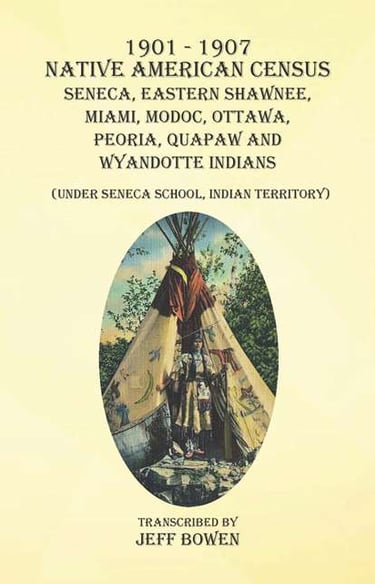1901-1907 Native American Census:
Seneca, Eastern Shawnee, Miami, Modoc, Ottawa, Peoria, Quapaw, and Wyandotte Indians
Jeff Bowen


Purchase From:
Amazon US
Barnes & Noble US
Vroman's Bookstore US
Blackwell's UK
For Libraries and Retailers Click below
ipage.ingramcontent
This book is a reproduction of the 1901-1907 Native American Census Under Seneca School in Indian Territory, Oklahoma, originally published in 1997. The census covers the names and families of Native peoples from eight different tribes; the Seneca, Eastern Shawnee, Miami, Modoc, Ottawa, Peoria, Quapaw and Wyandotte Indians. This piece obviously is more valuable than ever because of its distance of time alone, from its first time out. Since 1997, almost three decades have passed since this volume's first printing. Now two and a half new generations that have heard stories from their parents and grandparents about their Native American bloodlines can reach back and confirm those names they have heard their whole lives. Likely this important volume has faded from library bookshelves needing to be renewed because of its gold mine of family names and the personal history that naturally follows with each page and individual family heritage. These pages are a piece of a huge puzzle for thousands of people today. You will find within these pages the particular agency each individual was at during each yearly census. Their names, family relations; son, daughter, grandparents, etc., with ages as well as possibly a date of birth or death. Depending on the recorder at the time of each census there are a few tribal statistics for some groups.
You will find a brief history covering a little of each tribes' past and present status within the introduction. This census is a small part of the people and history surrounding what was known as the “Seneca Indian School” which amazingly operated from 1872-1980. The land was originally donated by the Wyandotte and the name changed several times till it was finally called Seneca School and much later ended up being occupied mostly by Cherokee students.
ISBN: 978-1-64968-159-1
paperback, 594 pages
